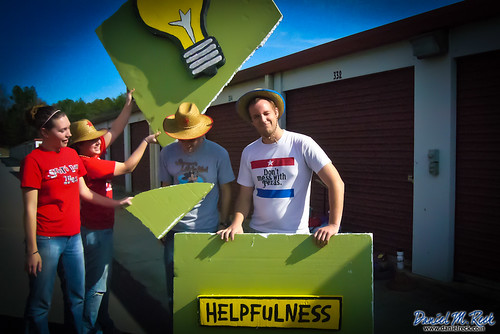My blog includes my #BuildingBetterBrains project, articles I've been invited to contribute, and remarks from events at which I have been asked to speak, in addition to comments written specifically for my web audience.
Please send your comments and critiques; they are always appreciated.
A century ago today, Arthur Eldred was the first young man to earn the Eagle Scout award from the Boy Scouts of America. The 17-year-old had completed his twenty-one merit badges with ease, and passed his board of review—in front of the BSA’s founders, no less—“with ease,” according to The Wall Street Journal’s Michael S. Malone.
In the decades since, the Eagle Scout award has become synonymous with success. It is the highest rank a young man may earn in the BSA, and requires that he hold leadership offices and participate in, design, and ultimately lead major community service programs. The nearly two dozen merit badges required cover a range of competencies, from world citizenship to lifesaving skills to financial management.
Historically only about 2% of Boy Scouts ever attain the award. “These Eagles in turn have changed the face of American culture in ways both obvious and unexpected,” says Malone.
Notable scientists, artists, Nobel Prize winners, politicians, military heroes, corporate and community leaders, and President Gerald Ford are all counted on the roster of Eagle Scouts. So too is Neil Armstrong, the first human to walk on the moon.
Read more: The Eagle Scout Award Turns 100 Amid Controversy; I’ll Keep Mine
Of late, there have been a series of challenges to college education. The lackluster economy, politics, evolving education technologies, and attention-grabbing commentators (not to be confused with legitimate journalists) have all affected the way colleges and universities go about their missions.
Particularly, liberal arts colleges and universities are questioned for having "un-focused" curriculums. Instead, some like Florida governor Rick Scott would like to focus higher education spending on science, technology, enginerring, and mathematics (STEM) to the exclusion of humanities studies. Alex Tabarrok, professor of economics at George Mason University, agrees.
I do not.
Prof. Tarrabok's recent essay in the Chronicle of Higher Education argues that studies in the humanities should not be subsidized, and that fields deemed "valuable" to society should be.
"There's nothing wrong with the arts, psychology, and journalism," he says, before spending three paragraphs expounding on what is wrong with studying in those fields. For instance, he argues that graduates in these fields "are less likely to create the kinds of innovations that drive economic growth." Prof. Tarrabok's essay is not uneducated, however.
Read more: Liberal Arts Scholars Necessary to Solve Education Woes
Andrew Kuebrich was among the first students I met when I began working at Monmouth College. He was the president of his chapter of Zeta Beta Tau Fraternity, so he and I talked frequently. I appreciated his willingness to "call it like it is" as we talked about the state of the college's fraternity system overall, and his fraternity in particular.
Andrew would drop in my old, dark, cave of an office (which is now the home of the college's student programming board) and plop down on one of the too-low chairs which was just not designed for his tall frame. He'd kick his feet up on the coffee table and make himself comfortable. There was something about that office that seemed a little conspiratory, and Andrew liked to play into that.
"Let me tell you a secret, Daniel," he would say, his eyes darting back and fourth, over-conspicuously looking for a phantom eavesdropper.
"What's that, Andrew?" I would ask.
"If low graduation and student transfer rates at City Colleges of Chicago don’t start improving, the system’s leaders could lose their jobs. That’s because the formal job responsibilities of the chancellor, presidents and even trustees include graduation rate goals," reports Paul Fain of Inside Higher Ed in his article, "Price of Success."
Having studied with the City Colleges of Chicago's previous chancellor, Dr. Wayne Watson, this story piqued my interest. Watson is now the president of Chicago State University, and has taught courses at Northwestern University's School of Education and Social Policy.
In our class, he discussed the challenge of measuring community colleges' graduation rates, because so many of the students who come to city colleges are not seeking a degree, or they take longer to finish it than the Department of Education metric allows.
According to this article, the Department of Education "looks at full-time, first-time students over a period equal to 150 percent of the time it would take to earn a credential" and "only 35 percent of the 127,000 students who attend City Colleges count toward that graduation measure, because many have studied elsewhere or enroll only part-time."
I would be interested in knowing how many students enter CCC as a full-time, first-time with no intention of completing a degree; perhaps they just want to take one year of classes and transfer to a four-institution. Or maybe they are interested in a certificate, trade, or professional program. Would these students be counted as failures in the graduation tally? What about students who begin a full-time degree program and then drop to part-time because of financial, family, or employment reasons? If they still complete their degree, but take seven years, then are they are failures?
Read more: Graduation Figures Aren't The End-All Measure of Success



